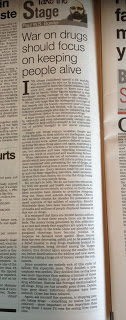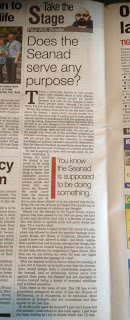My column in The Kerryman. 26 June, 2013
It’s not easy to be pro-choice and defend the Protection of Life during Pregnancy Bill. So restrictive and mean-spirited is its interpretation of the Supreme Court decision on X and the two resulting referendums, that one could deem it an insult to the Irish people. I’d still vote for this terrible piece of legislation if I had a say in the matter. I’d vote for it because I cannot imagine any government in Ireland, really standing up to the vested interests that wish to keep Irish abortions in the UK.
I support this terrible piece of legislation, even though it’s more than probable, its provisions wouldn’t have saved the life of Savita Halappanavar. The doctor who conducted the HSE investigation into the death of Halappanavar, Sir Sabaratnam Arulkumaran, Professor Emeritus of Obstetrics and Gynaecology, stated that clinical practice in other jurisdictions is to terminate the pregnancy as early as possible if faced with the symptoms that she presented.
This legislation wouldn’t have helped in Halappanavar’s case because the transition from her condition being a threat to her health, to becoming a threat to her life, was so quick, that waiting for the conditions of this legislation to be satisfied, would’ve meant it would be too late to save her.
I support this terrible piece of legislation even though a victim of rape will now face a prison sentence of 14 years if she manages to procure a termination in this country, of any pregnancy resulting from that rape. In the unlikely circumstance that the man who attacked her is convicted of rape, he might get 14 months.
I support this terrible piece of legislation even though it ignores women who must endure the tragedy of a fatal foetal abnormality. Women whose pregnancies will inevitably end in the death of their baby will continue to be forced to access terminations in the UK.
I support this terrible piece of legislation even though it means a pregnant woman experiencing a medical emergency will continue to face the uncertainty of not knowing just what kind of doctor she is being treated by. Will that doctor offer her all the available options to save her life, or only those allowed for by his or her conscience? Worse, how much time will elapse between this conscientious objector washing their hands of the situation and another doctor getting up to speed?
I support this terrible piece of legislation even though if a friend of mine experiencing a crisis pregnancy asked me for advice, I would suggest a therapist and then if certain, go to the UK. Have absolutely nothing to do with the suicide provisions in this legislation.
I support this terrible piece of legislation all the more because of the pathetic hand-wringing of some Fine Gael TDs and Senators. They demand a free vote. They deem it a right to have a free vote. There was a time when Christians were made of sterner stuff, but they fear the loss of the Fine Gael logo from their stationery.
This is a terrible piece of legislation, but in certain, very limited, heavily monitored situations, it may save a life or two. The vast majority of the 5000 women who travel to the UK every year to exercise control over their own bodies, will hardly even notice its passage.







